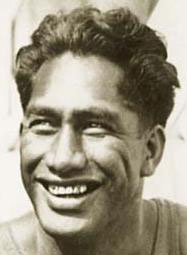Duke Paoa Kahanamoku
Duke Paoa Kahinu Mokoe Hulikohola Kahanamoku (1890-1968) was a Hawaiian swimmer, actor, lawman, early beach volleyball player and businessman credited with spreading the sport of surfing. He was a five-time Olympic medalist in swimming. The name "Duke" is not a title, but a given name. He was named after his father, Duke Halapu Kahanamoku, who was christened "Duke" by Bernice Pauahi Bishop in honor of Prince Alfred, Duke of Edinburgh. When Duke's name became a household name due to his swimming feats, many people thought he was of Hawaiian Royalty because of his name. Duke always got a chuckle of being thought of as royalty and never hesitated to set the record straight about his lineage. In the 1912 Olympics, Duke and the U.S. Olympic swimming team broke the record for the 4x200 meter relay. Duke went on to win a gold medal in the 100 meter freestyle (Stockholm). During the 1920 Olympics in Antwerp, he won gold medals both in the 100 meters (bettering fellow Hawaiian Pua Kealoha) and in the relay. He finished the 100 meters with a silver medal during the 1924 Olympics in Paris, with the gold going to Johnny Weissmuller and the bronze to Duke's brother, Samuel Kahanamoku. He also played for the U.S. water polo team at the 1932 Summer Olympics. Between Olympic competitions, and after retiring from the Olympics, Kahanamoku traveled internationally to give swimming exhibitions. It was during this period that he popularized the sport of surfing, previously known only in Hawaii, by incorporating surfing exhibitions into these visits as well. His surfing exhibition at Sydney's Freshwater Beach (1914) is widely regarded as a seminal event in the development of surfing in Australia. The board that Kahanamoku built from a piece of pine from a local hardware store is retained by the Freshwater Surf Club. There is a statue of Kahanamoku on the headland at Freshwater. He made surfing popular in mainland America first in 1912 while in Southern California. During his time living in Southern California, Kahanamoku performed in Hollywood as a background actor and a character actor in several films. Kahanamoku was involved with the Los Angeles Athletic Club, acting as lifeguard and competing on both swimming and water polo teams. While living in Newport Beach, California on (1925), Kahanamoku rescued eight men from a fishing vessel that capsized in heavy surf while attempting to enter the city's harbor. 29 fishermen went into the water and 17 perished. Using his surfboard, he was able to make quick trips back and forth to shore to increase the number of sailors rescued. Newport's police chief at the time called Duke's efforts "the most superhuman surfboard rescue act the world has ever seen." In 1940, he married Nadine Alexander, who accompanied him when he traveled. Kahanamoku was the first person to be inducted into both the Swimming Hall of Fame and the Surfing Hall of Fame. The Duke Kahanamoku Invitational Surfing Championships are named in his honor. He is a member of the U.S. Olympic Hall of Fame. He served as sheriff of Honolulu, Hawaii from 1932 to 1961, serving 13 consecutive terms. During this period, he also appeared in a number of television programs and films, such as Mister Roberts (1955). Hawaii music promoter Kimo Wilder McVay capitalized on Kahanamoku's popularity by naming his Waikiki showroom "Duke Kahanamoku's", and giving Kahanamoku a piece of the financial action in exchange for the use of his name. It was a major Waikiki showroom in the 1960s and is remembered as the home of Don Ho & The Aliis from 1964 through 1969. Kahanamoku's name is also used by Duke's Canoe Club & Barefoot Bar, a beachfront bar and restaurant in the Outrigger Waikiki On The Beach Hotel. There is a chain of restaurants named after him in California and Hawaii called Duke's. A monument at Waikiki beach in Honolulu honors his memory. It shows Kahanamoku standing in front of his surfboard with his arms outstretched. Many honor him by placing leis on his statue. There is a webcam watching the statue, allowing visitors from around the world to wave to their friends. On August 24, 2002, which was also the 112th anniversary of the birth of Duke Kahanamoku, a 37c first-class letter rate postage stamp of the United States Postal Service with Duke's picture on, was issued. The First Day Ceremony was held at the Hilton Hawaiian Village in Waikiki and was attended by thousands. At this ceremony, attendees could attach the Duke stamp to an envelope and get it canceled with a First Day of Issue postmark. These First Day Covers are very collectable. z
|
